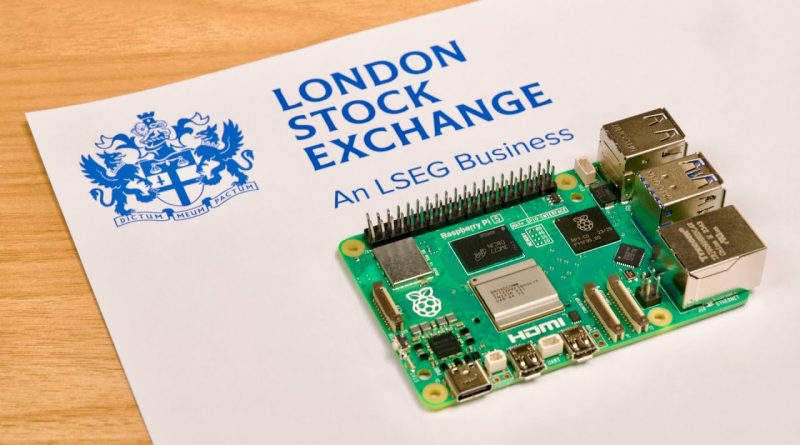Raspberry Pi Intends to Float: New IPO details
Raspberry Pi just announced an ‘Intention to Float’. What can we learn from the latest release from the London Stock Exchange?
Read the full document here: https://www.londonstockexchange.com/news-article/market-news/expected-intention-to-float/16470316
And see my earlier thoughts on the IPO here: https://www.jeffgeerling.com/blog/2024/raspberry-pi-ipo-selling-out
Support me on Patreon: https://www.patreon.com/geerlingguy
Sponsor me on GitHub: https://github.com/sponsors/geerlingguy
Merch: https://redshirtjeff.com
Main Channel: https://www.youtube.com/@UCR-DXc1voovS8nhAvccRZhg
2nd Channel: https://www.youtube.com/@UCsd6hP-zzIkCpw8XGw7Osyw
by Level 2 Jeff
linux foundation




During shortages ARM stuck by their business customers, while NVidia, EVGA, AMD, ASUS, Gigabyte, etc blew off their longtime customers to serve crypto-miners.
Please Reply Can I install React OS, Ubuntu OS and other minimum requirement OS on Raspberry Pi Zero W and Raspberry Pi Zero W 2 ?
RIP Raspberry PI
Obvious thing to do for Eben and the board, as they'll all get many millions for their stock of the existing Ltd entity, and if they continue for a bit, in their current roles, the non executives they appoint, for many beer tokens, will point out they've been underpaying themselves, by an order of magnitude, and all receive a seven digit pay rise, to bring their pay in line with that of a PLC board, of a tech unicorn (value in excess of a billion). They'll also all be able to add the built and IPO'ed a unicorn, to their LinkedIn profiles, and see what opportunities are then proposed. Eben gets a pile of cash for his decade and a half as the head, as will the bankers, and lawyers involved in the IPO.
Let the enshittification begin.
with the next windows natively supporting arm, i expect them to offer desktop machines with more power and expansion slots this or next year, they have a opportunity to become a desktop manufacturer like hp or dell but focused on small size and low power
it will be a change, for sure, but also could be a problem
Raspberry Pi Ltd. Investment Rating: 8/10
Strengths:
Market Leadership and Brand Recognition: Raspberry Pi is a well-known brand with a strong market position in the SBC and IoT sectors.
Financial Performance: Strong revenue growth and profitability metrics suggest a well-managed and financially sound company.
Total Addressable Market (TAM): Significant growth potential with a TAM of $21.2 billion.
Strategic Partnerships: Collaborations with industry leaders like Sony and Arm enhance its technological capabilities and market reach.
ESG Credentials: Commitment to sustainability and support for educational initiatives can attract socially responsible investors.
Innovation and R&D: Continued investment in research and development ensures a steady pipeline of new products.
Risks:
Market Volatility: The technology sector is prone to rapid changes and can be volatile.
Competition: The SBC and IoT markets are competitive, with many companies offering similar products.
Supply Chain Issues: Past component shortages could pose risks to future production and sales.
Dependence on Key Partners: Reliance on partners like Sony for manufacturing could be a risk if these relationships are disrupted.
Regulatory and Geopolitical Risks: Operating in multiple countries exposes the company to various regulatory and geopolitical risks.
IPO Market Conditions: The success of the IPO may depend on market conditions at the time of the offering.
During the covid years i discovered esp32 microcontrollers and as you say, i can run sensors and drive leds, relays and displays and connect to wifi. There is not a much computing power on an esp32 but an esp32 can do quite a bit. Like you said as well, the pi is now somewhere in between a mini pc and a microcontroller that can run linux.
This is the kind of video I love from you. The moving house or new studio videos should not make it to the channel. They are irrelevant
I can't wait to see RPi 6 that's 3% faster than the pi 5 for 150$, still no power supply included.
It did a lot of good while it lasted. We will remember the good times.
I would rather the company go bankrupt than the companies image be ruined by shareholders tomfoolery. No matter how good it seem on the surface.
ARM was created by 3 companies two of which were from the USA, it was very much a US company from the beginning. Its clear they want the money to make their own SoC for future Pi's.
They need to underwrite at different prices. There is already enough pushback in the market on price that price based competition is starting. There are more tutorials that don't depend on the raspberry pi. So, things are likely to begin the slow and inevitable slide, which is good for consumers who want low prices. If they had managed to be keep up with supply during covid, they would likely remain the golden boy of the SBC market, but with the entrance of so many sellers that can compete at lower prices, I think that short of additional opportunities and serious gatekeeping/protectionism to get Raspberry Pi incredibly privileged contracts, they might be old news. What they need is a sugar daddy to float lines of credit during the times they need it, flexible repayment and virtually no threat of foreclosure outside of bad faith or misconduct by the executives – if the durable interest is affordable and relevant SBCs for computer education.
Please, god, no. The instant a company goes public, the customers take a backseat to the shareholders.
I think Raspberry Pi LTD will continue to thrive as long as they support the community around RPi. It's the real killer app they have. The support and documentation available is just second to none when it comes to the micro-controller/linux mini-pc game.
Which means a ton of business clients essentially get free tech support from an open community. That's not necessarily a bad thing, having more competitive businesses ecosystem through community is awesome, but seeing the numbers of business partners triple the education market (which has been known for a while now) is really disheartening. Especially when considering the Raspberry Pi Foundation's educational goals vs Raspberry Pi LTD's business goals.
Sure, RPF could pivot to a different micro controller, or work with RPILTD to make a discounted educational model subsidized by their business partnerships, but that's antithetical to the goals of shareholders. Unless RPILTD's IPO is the first in history to have purely altruistic shareholders, the prospect of discounted educational computing devices becomes less and less likely.
Raspberry pi has lost its way altogether
Single Board Computers as a platform died a long time ago They're no longer the inexpensive idea they used to be some years ago and are outperformed en masse by mini PCs. And with the advent of cheaper FPGA boards and chips, they lost that bit of market as well when they only had to compute against micro-controller boards. And in some countries, they were never affordable to begin with.
"non-cloneable silicon" doesn't mean you cannot buy the chips: You can buy reels of RP2040s and build whatever you want with them. Farnell over here in Blighty are selling reels of 3,400 at £0.553 a unit. It's a pretty decent chip (though it'd benefit from an FPU and better external RAM support).
I wonder when the first round of layoffs is going to happen.
Once upon a time, Raspberry Pi was (way) ahead of competition. As in many markets, competition has been playing catch-up with gradually more success, up to the point that now it's about time for Raspberry Pi to come up with something innovative to surge ahead once again. That means investing and for investing you need money, hence they choose to go public. That's not necessarily a bad idea. It all depends on their vision, where they want to go and what they're going to come up with in terms of new ideas and products. Like it or not, even as a not-for-profit, Raspberry Pi does operate in a competitive environment and need to move forward. Let's give them the benefit of the doubt.
The only people who are angry about RPF prioritizing the business channel over the retail market are people who didn't hear RPF say over and over they had contracts they were obligated to fulfill.